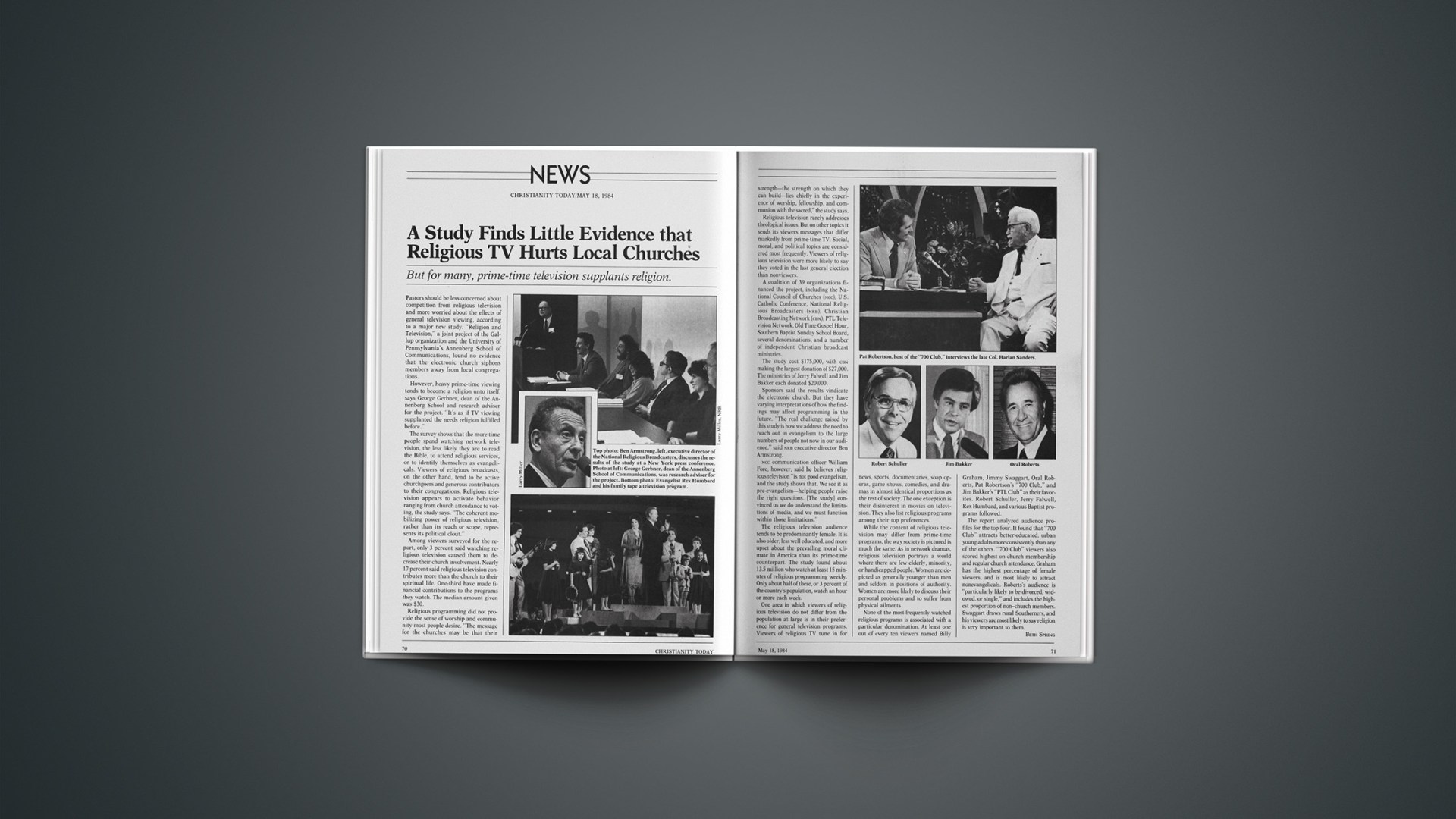But for many, prime-time television supplants religion.
Pastors should be less concerned about competition from religious television and more worried about the effects of general television viewing, according to a major new study. “Religion and Television,” a joint project of the Gallup organization and the University of Pennsylvania’s Annenberg School of Communications, found no evidence that the electronic church siphons members away from local congregations.
However, heavy prime-time viewing tends to become a religion unto itself, says George Gerbner, dean of the Annenberg School and research adviser for the project. “It’s as if TV viewing supplanted the needs religion fulfilled before.”
The survey shows that the more time people spend watching network television, the less likely they are to read the Bible, to attend religious services, or to identify themselves as evangelicals. Viewers of religious broadcasts, on the other hand, tend to be active churchgoers and generous contributors to their congregations. Religious television appears to activate behavior ranging from church attendance to voting, the study says. “The coherent mobilizing power of religious television, rather than its reach or scope, represents its political clout.”
Among viewers surveyed for the report, only 3 percent said watching religious television caused them to decrease their church involvement. Nearly 17 percent said religious television contributes more than the church to their spiritual life. One-third have made financial contributions to the programs they watch. The median amount given was $30.
Religious programming did not provide the sense of worship and community most people desire. “The message for the churches may be that their strength—the strength on which they can build—lies chiefly in the experience of worship, fellowship, and communion with the sacred,” the study says.
Religious television rarely addresses theological issues. But on other topics it sends its viewers messages that differ markedly from prime-time TV. Social, moral, and political topics are considered most frequently. Viewers of religious television were more likely to say they voted in the last general election than nonviewers.
A coalition of 39 organizations financed the project, including the National Council of Churches (NCC), U.S. Catholic Conference, National Religious Broadcasters (NRB), Christian Broadcasting Network (CBN), PTL Television Network, Old Time Gospel Hour, Southern Baptist Sunday School Board, several denominations, and a number of independent Christian broadcast ministries.
The study cost $175,000, with CBN making the largest donation of $27,000. The ministries of Jerry Falwell and Jim Bakker each donated $20,000.
Sponsors said the results vindicate the electronic church. But they have varying interpretations of how the findings may affect programming in the future. “The real challenge raised by this study is how we address the need to reach out in evangelism to the large numbers of people not now in our audience,” said NRB executive director Ben Armstrong.
NCC communication officer William Fore, however, said he believes religious television “is not good evangelism, and the study shows that. We see it as pre-evangelism—helping people raise the right questions. [The study] convinced us we do understand the limitations of media, and we must function within those limitations.”
The religious television audience tends to be predominantly female. It is also older, less well educated, and more upset about the prevailing moral climate in America than its prime-time counterpart. The study found about 13.5 million who watch at least 15 minutes of religious programming weekly. Only about half of these, or 3 percent of the country’s population, watch an hour or more each week.
One area in which viewers of religious television do not differ from the population at large is in their preference for general television programs. Viewers of religious TV tune in for news, sports, documentaries, soap operas, game shows, comedies, and dramas in almost identical proportions as the rest of society. The one exception is their disinterest in movies on television. They also list religious programs among their top preferences.
While the content of religious television may differ from prime-time programs, the way society is pictured is much the same. As in network dramas, religious television portrays a world where there are few elderly, minority, or handicapped people. Women are depicted as generally younger than men and seldom in positions of authority. Women are more likely to discuss their personal problems and to suffer from physical ailments.
None of the most-frequently watched religious programs is associated with a particular denomination. At least one out of every ten viewers named Billy Graham, Jimmy Swaggart, Oral Roberts, Pat Robertson’s “700 Club,” and Jim Bakker’s “PTL Club” as their favorites. Robert Schuller, Jerry Falwell, Rex Humbard, and various Baptist programs followed.
The report analyzed audience profiles for the top four. It found that “700 Club” attracts better-educated, urban young adults more consistently than any of the others. “700 Club” viewers also scored highest on church membership and regular church attendance. Graham has the highest percentage of female viewers, and is most likely to attract nonevangelicals. Roberts’s audience is “particularly likely to be divorced, widowed, or single,” and includes the highest proportion of non-church members. Swaggart draws rural Southerners, and his viewers are most likely to say religion is very important to them.










